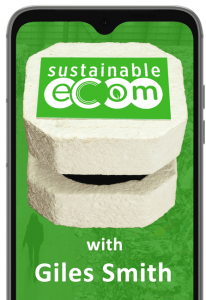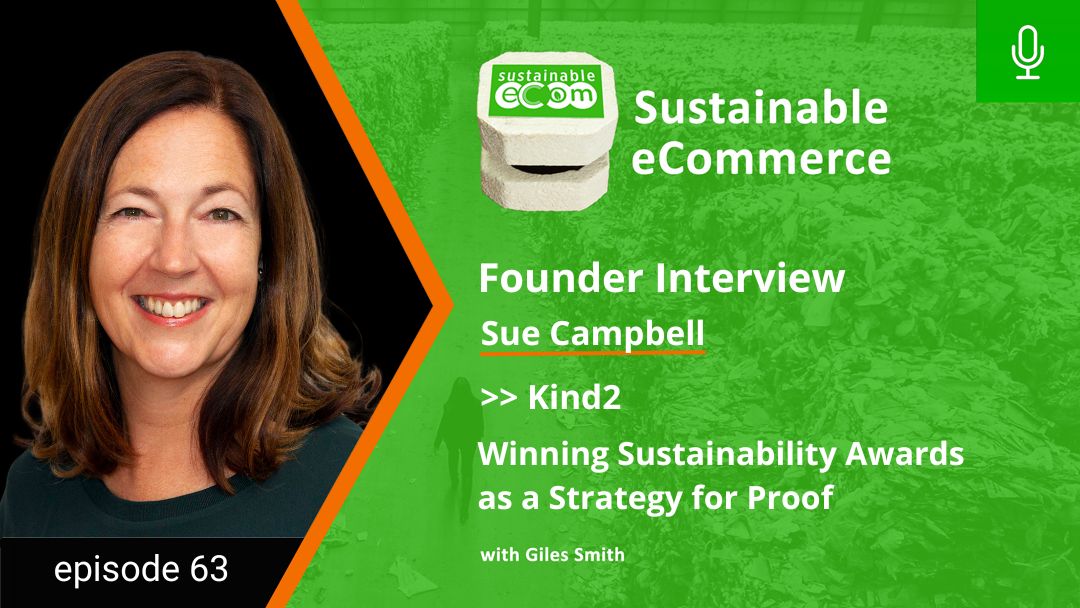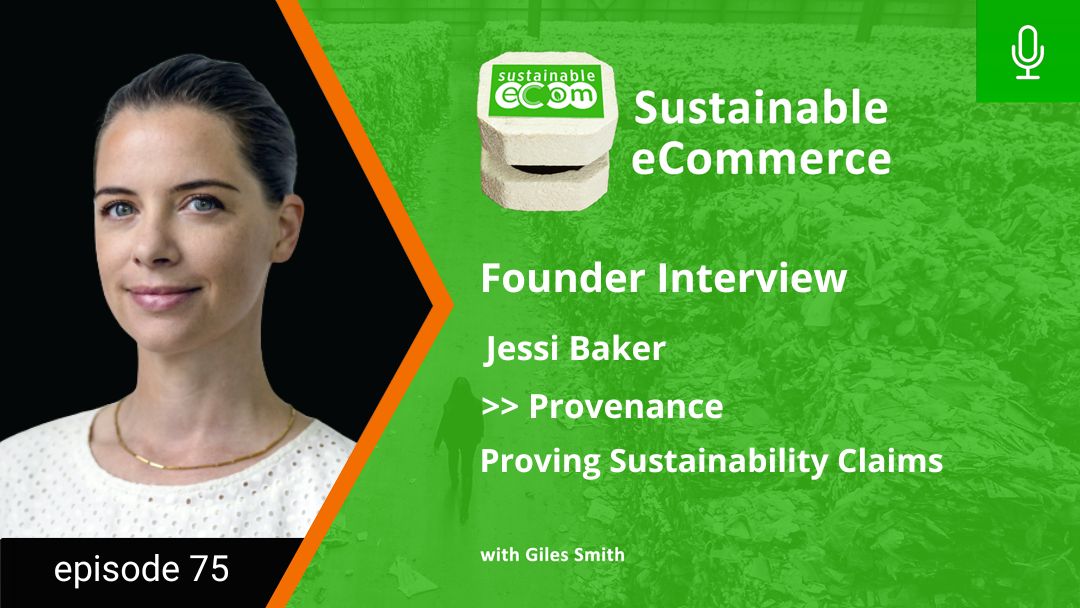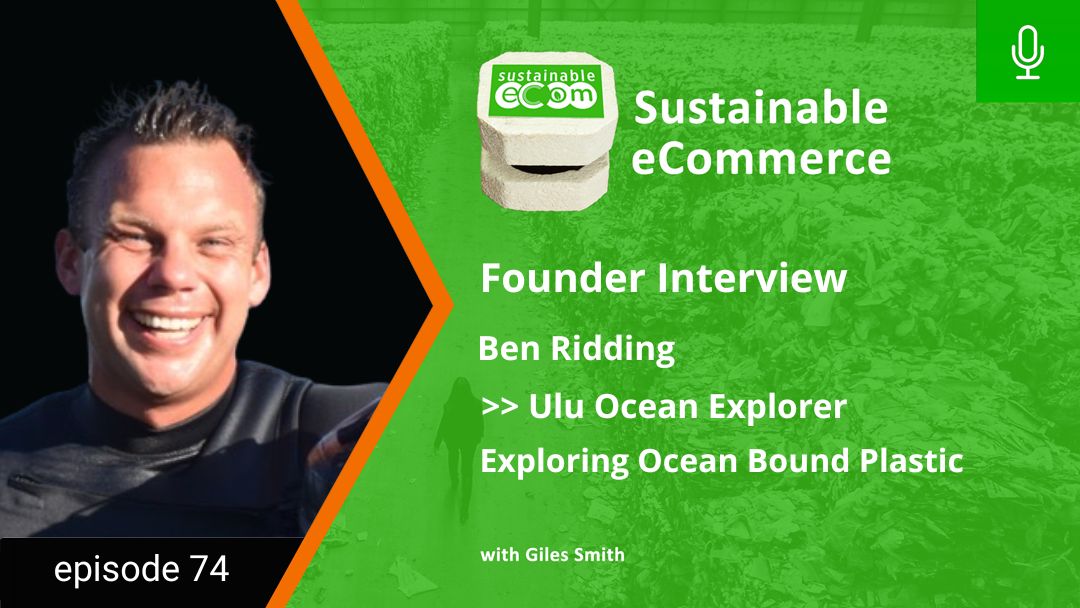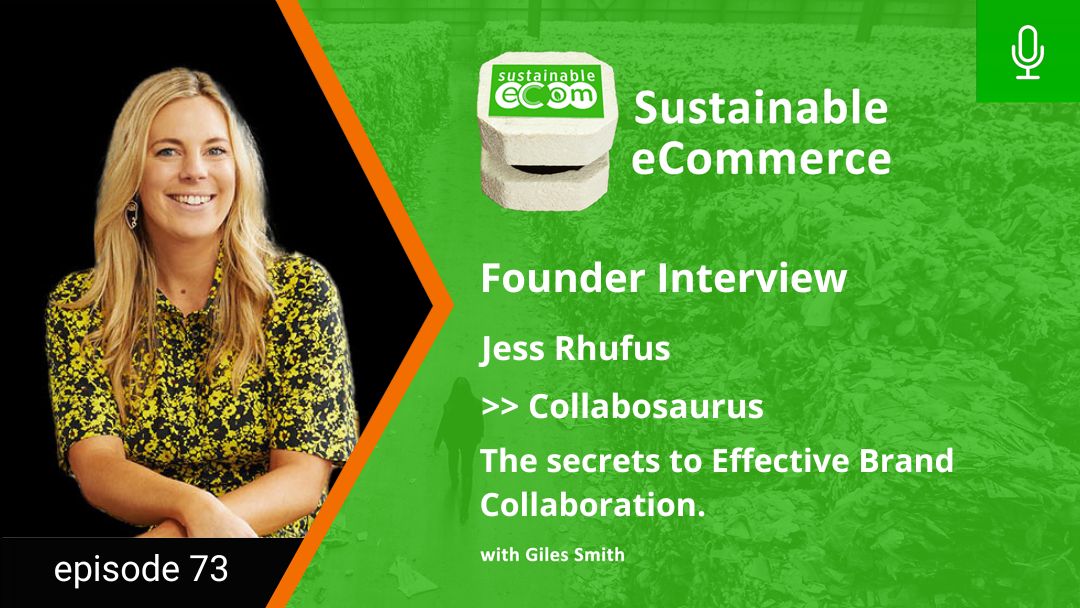Sustainable Ecommerce Podcast Episode 63
One of the most important and challenging aspects to sustainability marketing is ensuring your story is authentic.
You can and should get science-backed proof in the form of certifications, and I’m working on a mini-series to help you with that later this year.
While those elements are important, they’re not the full story. To choose your brand, customers want to know that your products are both better functionally AND better for the environment. Proving sustainability claims with science does just that, without focusing on proving how your product solves the customer’s problem.
So today, we’re exploring 2 other forms of proof that check off both of these two problem sets by talking with a founder that I think is doing this particularly well.
My guest today is Sue Campbell, an Aussie entrepreneur building her solid shampoo brand KIND2 over in the UK.
Being bootstrapped, like many brands cashflow is extremely tight, which means spending 10’s of thousands on Life Cycle Assessments was out of sight, yet Sue knew that customers were never simply going to take her word for how her shampoo was both effective and Kind to the Planet. And to solve that she’s always placed a strong focus on acquiring the 2 forms of proof we’re talking about today.
The first is social proof, and of course we’re talking about reviews and testimonials. And the other one is sustainability awards. Of all the brands we’ve had on the show so far, I think Kind2 probably has the biggest trophy cabinet, which is no small achievement given she really only has a handful of products.
What I’m excited to share with you though is the strategic approach she takes to getting those awards.
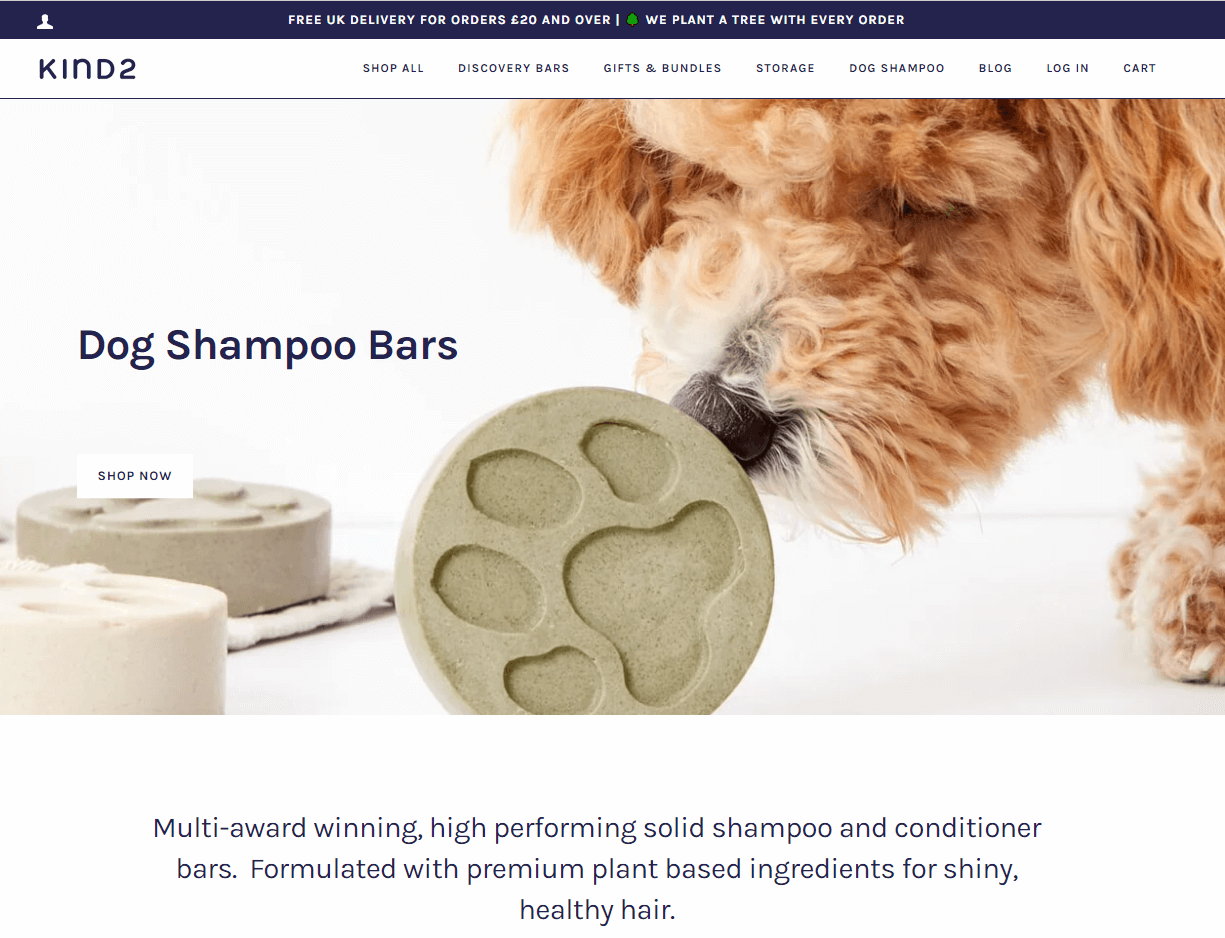
Getting Started with Kind2
Sue worked for a recruitment company for many years before deciding to branch out and start her own business. The decision to create Kind2 in particular emerged from seeing so much rubbish abandoned in places she’d visited around the world, especially countries in Asia like Hong Kong, Bali & the Philippines. Seeing the plastic in particular made her consider the reality of western companies making products and shipping that plastic into Asia where they have no infrastructure to collect or recycle it.
For Sue, experiencing the scale of the single use problem for things like toiletries in the Philippines led her to explore shampoo, and finally to making solid shampoo.
From the start Sue knew that people would not use the product unless it was at least as good as liquid shampoo. She worked with an independent cosmetic formulator to make the most effective product possible. She then spent many months calling up factories to find a manufacturer to take her unique formula and start manufacturing solid shampoo bars. Today, Kind2 makes a variety of solid shampoo for both humans and dogs.
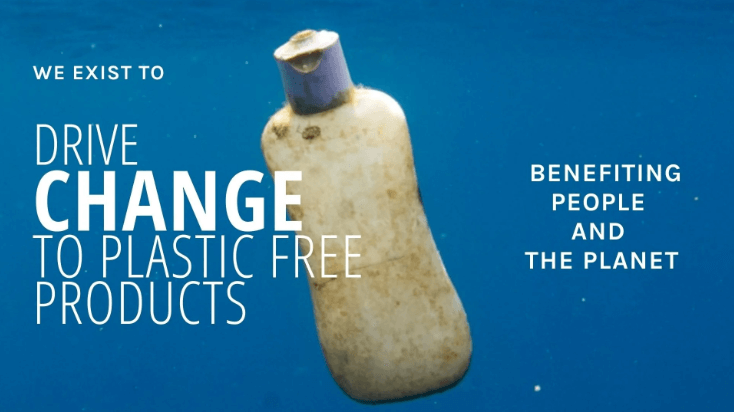
Shampoo Vs Soap
Soap is a specific formulation made through a process of saponification, where animal fats or oils are heated with lye. Classically, the finished soap has a high PH (alkaline), which tends to dry out the more acidic skin and hair. Shampoo works in the same way as soap by foaming up and taking away dirt through surface tension, but Kind2 shampoo contains natural ingredients more carefully attuned to PH of your hair and scalp.
Using Upcycled Ingredients
With a strong focus on sustainability, Sue knew she wanted to leverage Kind2 to focus on circularity as much as possible. After formulating the shampoo and producing the first batch of products, she sought providers of upcycled ingredients, focusing on things that were sourced from or made in the UK. Starting with hemp seed oil, they expanded to charcoal for the second set of products, which is a great source of oil absorption as well as natural colouring.
The biggest challenge with upcycled ingredients is actually the consistency and predictability of supply. As a result, Kind2 use it whenever they can, but don’t focus on it as a clear point of difference.

Getting Social Proof
There is no doubt that consumers are facing review fatigue, yet gaining social proof and validation from other customer is critical to store sales conversion. From very early on, Sue worked hard on reaching out to customers and asking them to post up reviews. She asked them to focus on helping other people with the experience of using solid shampoo, how to use it and how to get the most from it.
When making review requests, the language you use is important. Sue approaches these by focusing on the great choice the customer has made in selecting solid shampoo. The idea is that making them feel good about their purchase means they will be proud of it, and want to share that feeling with other people. Using this approach, your social proof actually elevates from a conversion element to being a tool for influencing social change.
For Kind2, Sue uses the Judge Me app, which is easy to us and provides authenticity badges. It is also easy to configure to stop things like repeated review requests for the same product, which can be a particular issue when dealing with consumable products.
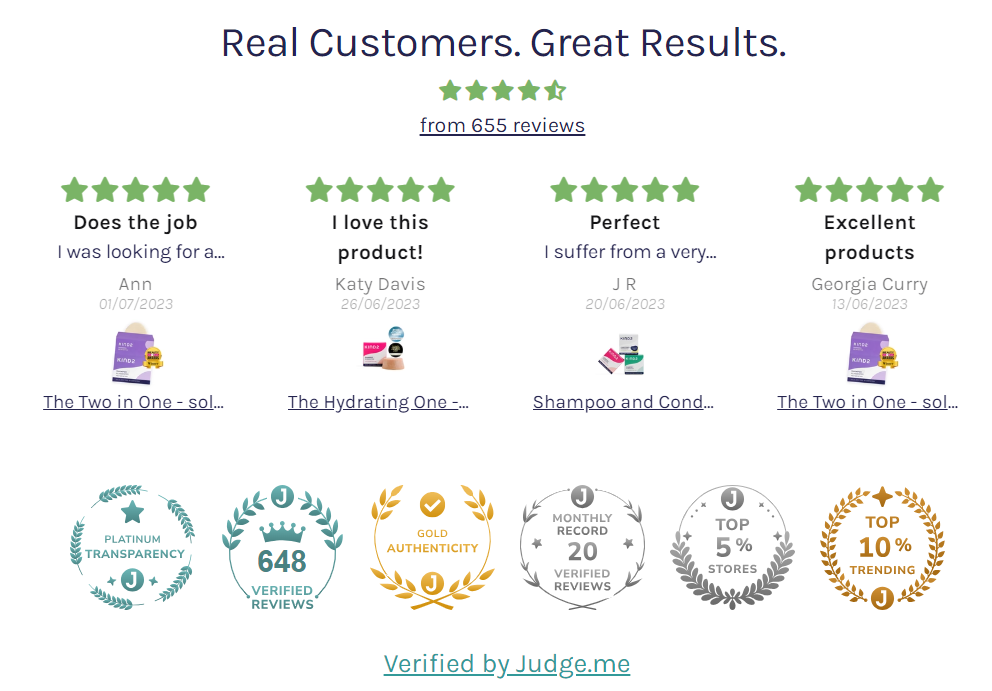
Taking a Strategic Approach to Getting Sustainability Awards
Sue’s first step is to take a close look at each award scheme for any patterns in the type of brands that get awarded prizes. For example, do the awards focus on indy brands? What were the qualities they were looking for when assessing products? Taking this first step helps narrow in on what to apply for.
A huge side benefit of the judging process is that you can detailed and insightful feedback from the judging panel, which would cost thousands if done via market research. For that reason, Sue focuses on awards that actually request samples to be sent in (many just require you to complete an application process and judge submissions based on the strength of the application).

Is Dog Shampoo Just a line extension or a whole new category?
Adding dog shampoo to the Kind2 line happened as a result of feedback from some customers. At first glance this seems like an obvious extension. Just like human hair, dog coats have a low PH unsuitable for many of the soap-based products on the market. Many dog shampoos are strong smelling, which is not necessarily ideal for the pet’s with super super sensitive noses.
However, marketing the product has been quite different, almost necessitating a different business model. It transpired that there was not a strong overlap with the existing Kind2 customer base, so uptake was lower than expected. In addition, being a lower margin product means much higher volume is required to generate growth. That has pushed Kind2 towards a wholesale model and looking for distributors into pet product chains.
What’s next for Kind2?
Overseas expansion outside the UK is a core focus for Kind2. They are also actively exploring new formulations and further product line extensions. Collaborations are a key focus too, especially around events like plastic-free July with other sustainable brands working on the same mission.
To try out Kind2 products head over to https://kind2.me
Top Takeouts
Sue shared some great points about getting social proof in the form of reviews. A decade ago you didn’t get asked to leave a review all that much, but the explosion of ecommerce brands & review platforms has changed all that, so it is much harder to get them than it used to be. You do need a more compelling angle than just ‘please leave a review in exchange for $5 off your next purchase’.
I really liked the way Sue approaches the wording, positioning the customer as the hero in her purpose-driven mission, and I can’t stress enough how much more effective that is. In fact, your strategy for getting reviews doesn’t start with the review request. It goes all the way back to how you’ve positioned your compelling brand story and the customer’s role in helping you make an impact.
If you’ve done that well, your review request becomes a natural extension of the hero’s story, an opportunity for them to share their story and invite other people to enjoy the good vibes.
As you heard, timing is also important, and when you send your requests will vary a little bit on how people use or consume the product your selling, and like anything you may need to experiment a bit to see what works best.
A couple of things to avoid – do not send the review request before the customer has received it, which means you need to think about how the automation gets triggered. And, make sure you don’t send review requests to people who have already left reviews on a product – that’s a sure way to annoy them and stop them opening review requests from other products in the future!
So lets talk about Awards. I really do admire Sue’s strategic approach. She takes time to hunt down the best awards to go for, ignoring things like magazine awards who’s focus tends not to be on small independent brands.
Look for who’s won previously and seek out awards where brands similar to yours have won in the past.
Look for awards where samples need to be provided. Doing so means that someone or perhaps a panel of people will be trying out your product, and can give you detailed feedback as part of the judging. That kind of information is GOLD, not just because you’re unlikely to ever get that detail from consumers, but also the judges are likely experienced in the field, and could be comparing your product with other similar products.





